13. The Origin of Responsibility
To summarise everything we’ve talked about, it seems like Miyamoto-san had an extreme sense of responsibility even back when he was the low man on the totem pole.
I’d say that’s right.
Basically Miyamoto-san has always looked at things from an executive’s perspective.
That’s true. But why? What’s up with that?
Uh...
Maybe you’ve always had this really intense sense of ownership; that idea that you were the one doing the work, so it was only natural to feel responsible for it.
Uh..., well, I think it comes from the fact that I wanted to be a cartoonist, way back when.
A cartoonist?
Yes. For an aspiring cartoonist, it’s all about how much response you get for the cartoons you’ve drawn, right?
Oh, so you mean that your work is directly related to how many people support it. Making video games is the same way.
So you’ve always worked with the idea that it’s all up to you whether your work can entertain the others or not.
I suppose it was a matter of fact for me.
Oh, I guess that makes sense.
I agree.
And then the fact that it has your name on it instills a certain sense of responsibility. “Written by Osamu Tezuka ,” for example. You’re conscious of the fact that it will say “Made by Shigeru Miyamoto.”
That’s right.
